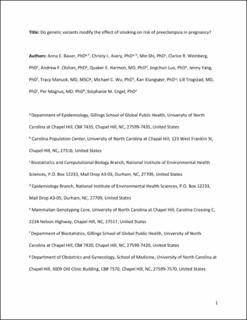| dc.contributor.author | Bauer, Anna E. | |
| dc.contributor.author | Avery, Christy L. | |
| dc.contributor.author | Shi, Min | |
| dc.contributor.author | Weinberg, Clarice R. | |
| dc.contributor.author | Olshan, Andrew F. | |
| dc.contributor.author | Harmon, Quaker E. | |
| dc.contributor.author | Luo, Jingchun | |
| dc.contributor.author | Yang, Jenny | |
| dc.contributor.author | Manuck, Tracy | |
| dc.contributor.author | Wu, Michael C. | |
| dc.contributor.author | Klungsøyr, Kari | |
| dc.contributor.author | Trogstad, Lill | |
| dc.contributor.author | Magnus, Per Minor | |
| dc.contributor.author | Engel, Stephanie M. | |
| dc.date.accessioned | 2022-04-04T11:39:50Z | |
| dc.date.available | 2022-04-04T11:39:50Z | |
| dc.date.created | 2022-01-04T18:27:08Z | |
| dc.date.issued | 2021 | |
| dc.identifier.issn | 0735-1631 | |
| dc.identifier.uri | https://hdl.handle.net/11250/2989586 | |
| dc.description.abstract | Objective: Maternal smoking is associated with as much as a 50% reduced risk of preeclampsia, despite increasing risk of other poor pregnancy outcomes that often co-occur with preeclampsia, such as preterm birth and fetal growth restriction. Researchers have long sought to understand whether this perplexing association is biologically based, or a result of noncausal mechanisms. We examined whether smoking-response genes modify the smoking-preeclampsia association to investigate potential biological explanations.
Study Design: We conducted a nested case–control study within the Norwegian Mother, Father and Child Birth Cohort (1999–2008) of 2,596 mother–child dyads. We used family-based log-linear Poisson regression to examine modification of the maternal smoking-preeclampsia relationship by maternal and fetal single nucleotide polymorphisms involved in cellular processes related to components of cigarette smoke (n = 1,915 with minor allele frequency ≥10%). We further investigated the influence of smoking cessation during pregnancy.
Results: Three polymorphisms showed overall (p < 0.001) multiplicative interaction between smoking and maternal genotype. For rs3765692 (TP73) and rs10770343 (PIK3C2G), protection associated with smoking was reduced with two maternal copies of the risk allele and was stronger in continuers than quitters (interaction p = 0.02 for both loci, based on testing 3-level smoking by 3-level genotype). For rs2278361 (APAF1) the inverse smoking-preeclampsia association was eliminated by the presence of a single risk allele, and again the trend was stronger in continuers than in quitters (interaction p = 0.01).
Conclusion: Evidence for gene–smoking interaction was limited, but differences by smoking cessation warrant further investigation. We demonstrate the potential utility of expanded dyad methods and gene–environment interaction analyses for outcomes with complex relationships between maternal and fetal genotypes and exposures. | en_US |
| dc.language.iso | eng | en_US |
| dc.publisher | Thieme | en_US |
| dc.title | Do Genetic Variants Modify the Effect of Smoking on Risk of Preeclampsia in Pregnancy? | en_US |
| dc.type | Journal article | en_US |
| dc.type | Peer reviewed | en_US |
| dc.description.version | acceptedVersion | en_US |
| dc.rights.holder | Copyright 2021. Thieme. All rights reserved | en_US |
| cristin.ispublished | true | |
| cristin.fulltext | postprint | |
| cristin.qualitycode | 1 | |
| dc.identifier.doi | 10.1055/s-0041-1740072 | |
| dc.identifier.cristin | 1974713 | |
| dc.source.journal | American Journal of Perinatology | en_US |
| dc.relation.project | Norges forskningsråd: 151918/S10 | en_US |
| dc.relation.project | National Institutes of Health: NIEHS Z01-ES103086 | en_US |
| dc.relation.project | Helse- og omsorgsdepartementet: N01-ES-75558 | en_US |
| dc.relation.project | National Institutes of Health: NICHD T32 HD052468 | en_US |
| dc.relation.project | Norges forskningsråd: 262700 | en_US |
| dc.relation.project | National Institutes of Health: NICHD R01HD058008 | en_US |
| dc.relation.project | National Institutes of Health: 1 U01 NS 047537-01 | en_US |
| dc.identifier.citation | American Journal of Perinatology. 2021 | en_US |
